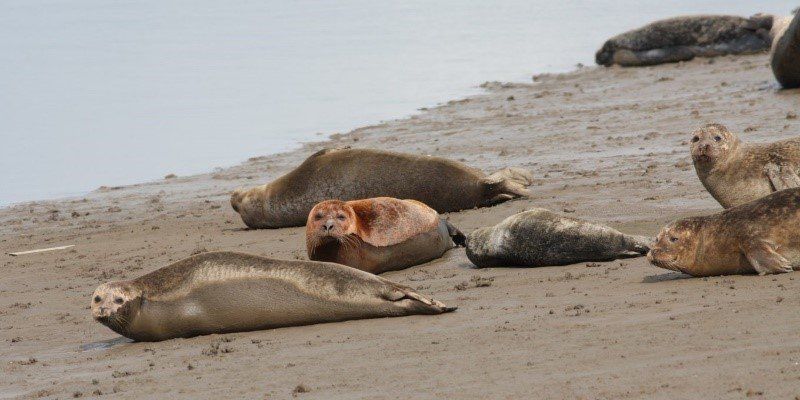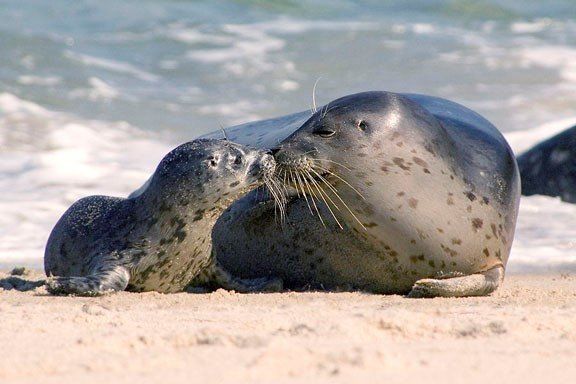The Mother-pup Bond in Harbour Seals.
The harbour seal (Phoca vitulina) is one of two native earless seals around the British Isles, the other one being the grey seal (Halichoerus grypus). Harbour seals, like many other marine mammals, are K-strategy reproducers, which means that they produce few but large pups, and provide much parental care. Harbour seal mothers are very attentive and keep their pups as close as they can to provide guidance and protection.
A study conducted by Wilson and Jones in 2018 investigated the mother-pup bond in harbour seals at two locations in Dundrum Bay: Minnerstown (rocky ledges with kelp forest) and Ballykinler (beach). They used digital camcorders and recorded the differences in mother-pup behaviour between the two locations, and between different intertidal zones (water, water’s edge, and dry zone).
Pups are active in the water a short time after birth, and have been recorded playing by their mothers, and following them in the water and to the water’s edge to suckle and rest (Wilson, 2001). On the rocky ledges at Minnerstown, mother-pup pairs were seen gathered in groups of pregnant females, mothers, and new-borns. These groups changed after a while into nursery groups of only mother-pup pairs (Wilson and Jones, 2018). However, on the beach at Ballykinler, these distinct groups were not seen. There was also a lower pup to adult ratio at the beach location (1:10) compared to the rocky site at Minnerstown (1:3). This suggests that the rocky ledges with kelp forests make for a more suitable habitat for pups compared to the sandy beach (Wilson and Jones, 2018).
The behaviour of mother-pup pairs includes moving between different spots in the haul-out site, playing, suckling, resting, scanning, body contact, and nosing behaviour (used by mother to create olfactory bond with pup). Playing, nosing behaviour and body contact is most common in the water and by the water’s edge. Suckling is usually seen only at the water’s edge, while the dry zone of the intertidal is almost limited to resting and sleeping. Pups in the dry zone have been found in the supine position which indicates a deeper sleep. In the study by Wilson and Jones, defensive behaviour of mother seals towards other seals approaching her and the pup was recorded 5 times in the water, six times at the water’s edge, and only one time in the dry zone, which further supports the classification of the dry zone as a resting zone.
Occasionally, the mother fails to keep her pup close and the pup gets lost. This can result in strandings, and if the pup is found early enough by humans it can be saved and taken to rehabilitation facilities. In some of these facilities, “orphaned” seals have been kept in isolated dry pens without other seals to socialise with, and without water to facilitate activity (MacRae et al., 2011). The study by Wilson and Jones highlights the importance of the social behaviour between mother and pup in the early stages of the pup’s development, as well as the importance of water for active behaviour. For a pup to recover and adopt an as-close-to normal behaviour as possible before being released into its natural habitat, access to a pool and other seals in these facilities might be very important.
References:
Wilson, S.C., (2001), Population growth, reproductive rate and neo-natal morbidity in a re-establishing harbour seal colony, Mammalia, Vol. 65, Issue 3, pages 319-334
Wilson, S.C., Jones, K.A., (2018), Behaviour of harbour seal ( Phoca vitulina vitulina) mother-pup pairs in Irish Sea intertidal habitats, Biology and Environment: Proceeding of the Royal Irish Academy, Vol. 118B, Issue 1, pages 13-27
SHARE THIS ARTICLE
















